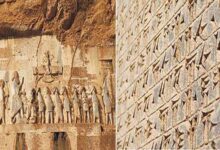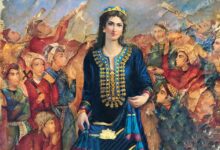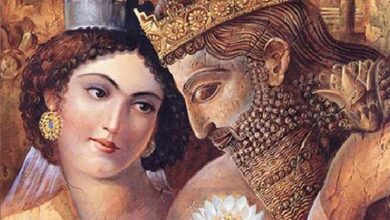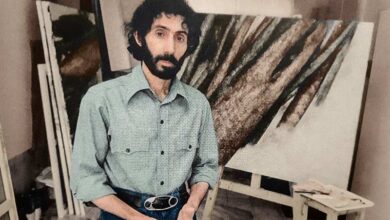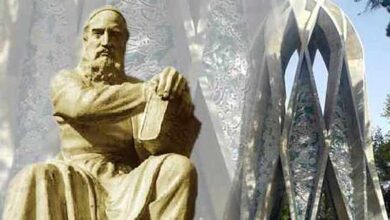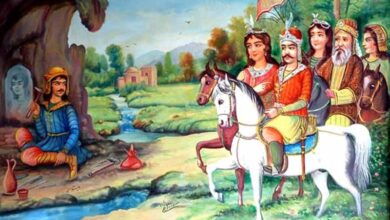Biography of Hafez

Khajeh Shams-ud-Din Mohammad Hafez was born in 792 AH in Shiraz, where the amber soil of love grows and his soaring cypress gardens teach the owners of resistance and freedom.
His father Kamaloddin was from Tuyserkan or Bahaoddin was from Kohpaye Isfahan and his mother was a virtuous woman from Kazerun. In his youth, his father, Mullah Ali, ascended to the position of Quds Ghodsian and left his three children and his wife alone. The brothers each went to a country due to the pressure of poverty, and Muhammad and his lonely mother thought only of their future with fear, until Muhammad’s mother left her young son, who was unable to manage that day, to take care of his upbringing. He got acquainted with the people of secret, from this time he started learning along with work and earning.
After a short time, Muhammad tried to find an independent job, to walk the path of life alone and get acquainted with the hardships, so a student of a bakery shop took up the job of kneading, because it was customary for kneaders to get up in the middle of the night. This tradition was a great opportunity for Muhammad to understand the special hours of the morning and take advantage of it. He himself has said after the spiritual stages:
“Every treasure of happiness that God gave to Hafiz was due to the night prayer and the morning prayer.”
Going to school
At the same time that he was kneading dough in a bakery shop, he came to the attention of the school house next to his place of business and decided to study the basics of formal sciences with others. In the hope of God’s grace and providence, he went to school and began to study science. From that day, he divided his daily income from kneading into four parts, part for his mother’s livelihood, part for the teacher, part for himself and part for the poor. Allocated. He also learned the Qur’an well during these days.
I’tikaaf in the tomb of Baba Koohi
On his way to school, Muhammad noticed that a young man with a literary taste and poetic talent was playing next to the school. He saw that sometimes young poets and literary lovers set up a poetry and literature assembly in the same shop. Muhammad also sometimes went to them and learned to compose poetry.
Such circles, which can still be seen in the corners of cities, are such a way that the poems of the participants are encouraged and approved, and sometimes they even count its objections and the so-called points that the poet It does not pay attention. One day, Mohammad recited his poem in a poetic gathering that he was attending. The audience began to eat one after another. They were somewhat upset with Mohammad. Eventually, Mohammad left the place in a state of ecstasy and left with a depressed memory. He took a mountain. For an hour in the holy shrine of that perfect mystic, he paid attention to the secrets and needs, it was in the same supplication and supplication that he was inspired. From then on, he spent the night in a well known as the well of Mortaz Alisha, alone and only in secret and in need of the door of the needless Imam. Eventually, the prayer of the burnt heart reached the goal of fulfillment and the witness became the target.
On one of the nights of solitude and solitude, who had fallen asleep in supplication to Hazrat Zul-Jalal, he dreamed of a knight who ascended from his compound act to the base of the Throne of Light and said to Shams al-Din Muhammad: “We gave you what you meant.” Meanwhile, he took a piece of light from Mubarak’s mouth and put it in the mouth of Shams al-Din Muhammad, saying: “The doors of science were opened to you, and you became rare in eloquence and rhetoric.” Shams-ud-Din Mohammad himself says: I had never eaten such a bite and enjoyed it. At that time, the man wanted to disappear because the sun was shining. I ran to find out from him how old Roshan Zamiri seemed to me and from him. I asked who this nobleman was and what was his blessed name? He said, “Do you not know?” His Holiness is the butler of Tahoor wine. The same greatness that the Prophet of God said in his honor: “This is the city of knowledge and Ali Baba”. Shams al-Din Muhammad says: In the meantime, I wanted to put my head on the ninth step and sacrifice my life for it. When I heard the sound of the muezzin at dawn, I woke up. I found my heart manifested by the blessing of that noble man. And I composed this lyric:
“They saved me from grief at dawn and gave me life in the darkness of the night.”
The next day he returned to the city, his companions asked him for a poem as usual, and Shams al-Din Muhammad recited this lyric for them, and when it was over, they said: So far, no poet has written a poem so well, how can we accept it from you? He replied, “Create a lyric so that I can make it too. They designed it and Shams al-Din Muhammad composed it and it was very good. They presented it again.” He said again that it was not better than that, Khawaja says. “I remember the mighty thing.”
Completion of formal sciences
After this Arbaeen decided to complete the formal sciences. He studied in the seminary of Khajeh Ghavam-ud-Din Abdullah, who was one of the great mystics and the foremost in terms of knowledge in his time, and learned various sciences. In terms of mysticism and recitation of the Qur’an, time was rare and he has memorized the entire divine book with 14 narrations, and what he received from mysticism and truth, he knew from the blessing of the Qur’an, which he said:
“Let your love reach the cry, if you recite a rough Qur’an like fourteen memorizers with fourteen narrations”
The eunuch obliged himself to go around the mausoleum located in the middle of the Shiraz mosque on Friday nights to return in the morning and recite the Qur’an aloud.
In a research book, Dashti has written an analysis of “Painting of Hafez” about the knowledge of his knowledge: Indeed, Hafez has surrounded all the information of his time that it is said that he knew the Qur’an from memorization and he himself points out that it was not the only phrase of the Qur’an The truth of the Qur’an, with all the interpretations that the active and petrified minds of the religious scholars had written up to that date and had shed light on its truths, had benefited greatly from the jurisprudence and wisdom of enlightenment, mastered the literary sciences of the Arabic language and the Persian language. Like that, he was a master, he walked in Sufism and reached the core of their teachings, and maybe he was a seeker of a way for a while, and his free thought, which escaped from any form, withdrew from their official basin.
Hafez’s withdrawal from official basins for various reasons has a clear and wide reflection in his sonnets with clarity and sometimes “repulsive” and “humorous”:
“I was heartbroken by the gossip of the school, yes, I will serve my beloved for a while.”
Religion of Hafiz
Hafez, who has not been seen with fascination and mania in all the monasteries of Moghan like him, has undoubtedly been a full-fledged Muslim who has had a loving devotion to the holy site of Imam Ali (AS) and the family of Hazrat Khatami, as he says:
In our religion, the word of truth is Nad Ali. Obedience, which was the acceptance of truth, is the memory of Ali
Among the creation of the universe is the purpose of God Ali and the descendants of Ali
Hafiz Gholam sincerely considers the court of Hazrat Ali Morteza (AS) as a king and advises the seekers of the path that if you are sincere in your devotion and love for the King of the World, namely Ali Ibn Abi Talib (AS), you will reach the royal position as he himself points out. Kurds:
“O heart of the slave, be the king of the world and be the king, always be in the support of God’s grace”
He bears witness to the remembrance of God, who is the beloved soul of the Messenger of God and his family, as he said:
“Hafiz is the beloved soul of the Prophet, and his family truly says, ‘God is the Judge.’
Know Yourself
To know oneself is a phrase attributed to Socrates, because Socrates is a great man, because Socrates knew himself and instead of addressing “him” he turned to “you” and tried to know “you” and serve ” To be “you” and to make the world beautiful and happy for “you” and to make it my father. He is a mystic man, mysticism means knowing, understanding the “what, because, how many” of man and his life and brewing it with existence and the secret of creation and perception Man and receiving man’s connection and covenant with the norm of creation, mysticism means “selfishness”, the effort and effort to reach and convey “I to you” and create the manifestation of truth and exhibition and the norm of creation and the creator of the Creator. Socrates burned himself to know and learn the truth. In Iranian mysticism, which is the abstract and essence of Hafez, one should search for “you” instead of “him” and seek selfishness and happiness for “you” and go to “you” because by joining “I to you”, “he It manifests itself spontaneously in that beautiful norm. Because man is his manifestation.
Man must think for himself, find himself, find life, touch. Find “those” and moments. Man must love existence and creation. We must free the shackles of Sufi worship and imitation from human hands and feet. Meditation is not what is current in the language of Sufis, meditation means waking up in the moments, “them”; To look within oneself, to integrate and find oneself and to become one with it.
* Sources and references are available in the editorial office of Artmag.


